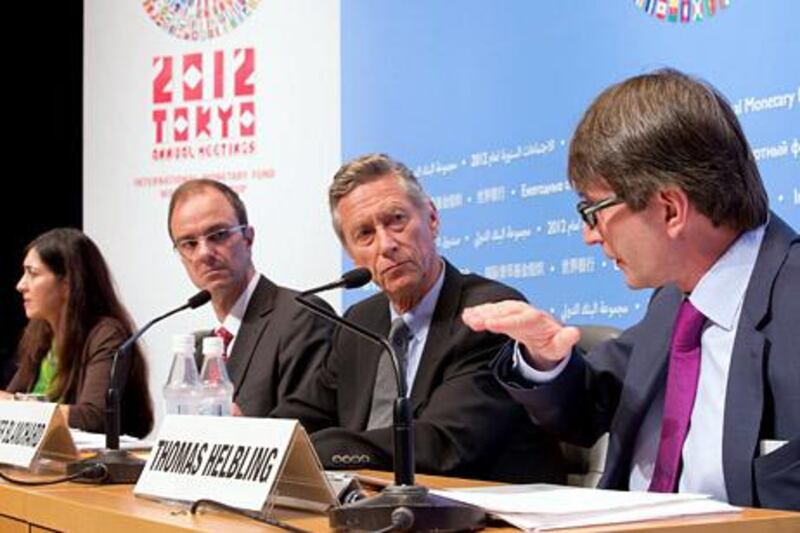The IMF warned that risks of a sustained global economic slowdown were "alarmingly high" - posing a threat to spending plans across the GCC and recovery around the world.
The agency revised down its forecast for global growth this year and next and said the future outlook depended in large part on how policymakers in the euro zone and the United States got to grips with their fiscal troubles.
Global growth this year would reach 3.3 per cent, short of its July forecast of 3.5 per cent, and the lowest rate of growth since 2009, the IMF said in its latest World Economic Outlook report. It lowered its outlook for growth next year by 0.3 percentage points to 3.6 per cent.
For oil exporters in the Middle East and North Africa, the fund's outlook for this year was revised upwards to 6.6 per cent, reflecting higher output from the return of Libya to the oil market.
The UAE's prospects were revised up to 4 per cent this year, from 2.3 per cent previously. Growth next year would slow and reach 2.6 per cent, down from a previous forecast of 2.8 per cent, the IMF forecast without giving a reason for the change.
"Risks around the world economic outlook projections have risen, consistent with market indicators and remain tilted to the downside," the IMF warned in the biannual report. "The oil price and inflation indicators point to downside risks to growth."
The IMF's gloomy outlook for the global economy follows similarly bleak forecasts by the World Bank, the Organisation for Economic Cooperation and Development, and the Asian Development Bank as well as a host of negative factory output readings from the euro zone to China in recent months.
The IMF pointed the finger of blame for much of the economic uncertainty at the euro zone and the US.
Its global projections for next year assumed euro-zone governments would follow the European Central Bank's plan to buy sovereign debt in exchange for commitments to reform and closer integration.
It also assumed the US congress would take action to avoid the fiscal cliff, the automatic expiry of tax cuts and spending cuts next year.
Failure to act on either issue would make growth prospects "far worse" and put pressure on oil prices, the IMF warned. That brought risks to oil exporters, it added.
"For oil exporters, government expenditures have risen to such a degree that substantial declines in the price of oil could undermine fiscal positions," it warned. "Despite significant accrued financial buffers, such declines could put at risk ongoing infrastructure and investment and growth."
Brent oil prices have fallen from a high for the year of US$128 a barrel in March to about $112.
Meanwhile, Iran and other geopolitical risks could lead to higher oil prices, the IMF said. High government spending and strong oil prices would help growth to remain robust in most oil exporting economies.
The fortunes of oil exporters was in contrast to oil importers. Growth would slide from 1.4 per cent last year to 1.2 per cent this year, before rebounding to 3.3 per cent next year, the IMF estimated.
"Uncertainties from political and economic change after the Arab Spring, slowing growth in major trading partners, and, in some cases, internal conflict have led to a marked weakening in activity," it said. "For oil importers, the policy priority will be preserving or rebuilding macroeconomic stability while defining and implementing a reform agenda to accelerate growth."





